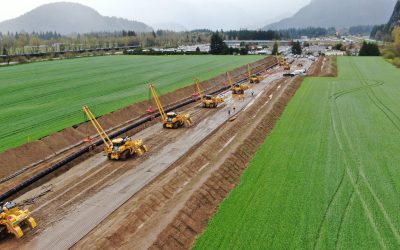When Prime Minister Stephen Harper lamented the rise of “repressive economics” in Latin America the other day, he cited specifically the class-warfare politics that we normally associate with deranged socialist states – such as, most flamboyantly, Venezuela. Remarkably, though, Chile is a socialist state itself these days and President Michelle Bachelet presides over the country’s second socialist government in six years. But Chilean socialism isn’t the same thing as Venezuelan socialism, or Canadian socialism, for that matter. Chilean socialism, among other differences, champions the free market – and hence, by definition, free trade.
Mr. Harper noted in his Santiago remarks that his visit coincided with the 10th anniversary of Canada’s free-trade agreement with Chile – an “overwhelming success” that Canada ironically neglected to pursue elsewhere in South America. “We are now getting back into the game of trade negotiations,” he said.
As indeed we are. International Trade Minister David Emerson has completed free-trade agreements (after eight years of lethargic negotiations by the Liberal governments of former prime ministers Jean Chrétien and Paul Martin) with Iceland, Norway, Switzerland and Liechtenstein.
He has revived dormant negotiations with Peru, Colombia and the Dominican Republic, along with the “Central American Four” – El Salvador, Guatemala, Honduras and Nicaragua.
Getting Canada “back into the game” is Mr. Harper’s most important economic achievement thus far. Chile shows how little we have done in the past 15 years, and how much we have to do. We have our deal with the four countries of the European Free Trade Association; Chile has a free-trade agreement with the 27-nation European Union. In Chile, Mr. Harper declared Canada “a country of the Americas.” Chile had already declared itself a country of Europe, Asia and the Americas, too.
Aside from Canada, Mexico, Central America and the U.S., Chile has fully functional trade deals with South Korea, New Zealand, Singapore, China and Japan. In 2005, it concluded a partial agreement with India and is now negotiating a full one. It has an economic association with six or seven South American countries. Negotiations are under way with Thailand, Malaysia and Australia. As for the rest of the world, Chile has enacted a legal limit (6 per cent) for any tariff against any import from any country.
Chile’s open-door approach to global trade has already made the country the wealthiest in South America, with GDP per capita of $12,700 (U.S.). (Brazilian GDP per capita is $8,800; Venezuelan, $7,200.) In 2006, with a year-over-year increase of 30 per cent, Chile set another new record for international trade transactions; its trade with the U.S. alone was up 60 per cent (adjusted for inflation). This trade is certain to increase. By 2012, Chile and the U.S. will be rid of all duties and tariffs.
Chile’s socialist governments have embraced more than free trade in the policy legacy of the celebrated “Chicago Boys,” the Chilean economists who studied at the University of Chicago in the 1960s and who wrote the free-market manifesto – El Ladrillo, the brick – that Augusto Pinochet, the autocratic general, adopted when Chile’s generals ousted Salvador Allende, the class-warfare Marxist, in 1972. Times do change. Last year, Ms. Bachelet (whose father died as a Pinochet political prisoner) won the presidency by promising to protect the country’s free-market institutions, including the private sector pension program, long vociferously denounced by the class-warfare left as cruel and Darwinian.
For emerging economies at least, private pensions have obvious benefits – so much so that China, the once-communist state, copied Chile, the once-fascist state. Because of its private pension program, Chile’s 16 million people now have a personal savings rate of 20 per cent and more than $70-billion in savings funds – a productive source of investment money. In 15 years, Chile’s poverty rate has fallen from 46 per cent to 13 per cent. (The Brazilian rate is 30 per cent; the Bolivian rate 60 per cent.) Whether socialist or not, Chile’s governments must budget for annual surpluses equal to 1 per cent of GDP, or $2-billion; in 2006, the surplus ($11.3-billion) was equal to 4 per cent of GDP. A comparable surplus for Canada’s federal government would be $45-billion (rather than its actual $10-billion).
Though unique in South America, Chile’s progress isn’t surprising. Chile did what Adam Smith advised more than two centuries ago in The Wealth of Nations – and the results are as Smith anticipated. Chile did falter for a couple of years in the global recession of the early 1980s – and the economy lost 20 per cent of GDP. But, through thick and thin, it has averaged growth of 7 per cent a year since 1990. The Chilean experience shows that free markets are thoroughly radical. In less than a single generation, Chilean free trade subverted the country’s repressive aristocracy, long protected by subsidies, took it down and replaced it with a democracy – which Chileans, in a national poll, resoundingly ranked the best government in South America.


